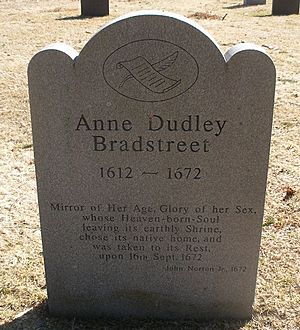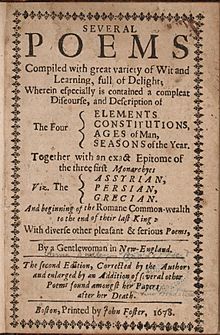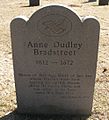Anne Bradstreet facts for kids
Quick facts for kids
Anne Bradstreet
|
|
|---|---|
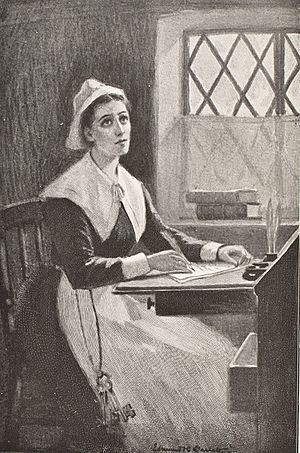
Nineteenth century depiction of Anne Bradstreet by Edmund H. Garrett. No portrait made during her lifetime exists.
|
|
| Born | Anne Dudley March 8, 1612 Northampton, England |
| Died | September 16, 1672 (aged 60) North Andover, Massachusetts |
| Occupation | Poet |
| Language | English |
| Nationality | British |
| Spouse | |
| Relatives | John Woodbridge(brother-in-law) |
Anne Bradstreet (born Dudley; March 8, 1612 – September 16, 1672) was an important early English poet in North America. She was the first writer in England's American colonies to have her work published. Anne Bradstreet is known as the first Puritan writer in American literature. She wrote many poems and personal writings, which were published after her death.
Anne was born into a wealthy Puritan family in Northampton, England. She loved to read and was especially inspired by the works of a poet named Du Bartas. She got married at age sixteen. In 1630, her parents and young family moved to the new Massachusetts Bay Colony. Anne was a mother of eight children. Her husband and father were important public officials in New England. She wrote poetry while also taking care of her family and home.
Her early poems were similar to Du Bartas's style. But later, she developed her own unique way of writing. Her poems often focused on being a mother, dealing with life's challenges, and her strong Puritan faith. Her first book of poems, The Tenth Muse Lately Sprung Up in America, was very popular in both America and England.
Contents
Anne Bradstreet's Life Story
Anne Bradstreet was born in Northampton, England, in 1612. Her father, Thomas Dudley, worked for a rich nobleman. Her mother was Dorothy Yorke. Because of her family's position, Anne grew up in a cultured home. She received a very good education for her time. She learned about history, several languages, and literature.
At age sixteen, she married Simon Bradstreet. Both Anne's father and her husband later became governors of the Massachusetts Bay Colony. In 1630, Anne, Simon, and Anne's parents sailed to America. They were part of the Winthrop Fleet, a group of Puritan settlers. They arrived in America on June 14, 1630. Their first stop was what is now Pioneer Village (Salem, Massachusetts).
The family soon moved to what is now Cambridge, Massachusetts. In 1632, Anne had her first child, Samuel. Even though she often had poor health, she had eight children. She also achieved a good social standing in the community. Anne had suffered from smallpox as a teenager in England. Later in life, her joints became paralyzed, causing her more health problems.
In the early 1640s, Anne's family moved for the sixth time. They went from Ipswich, Massachusetts, to Andover Parish. This area is now called North Andover, Massachusetts. The Bradstreet family lived in the Old Center of North Andover.
Connection to Harvard University
Both Anne's father and her husband helped start Harvard University in 1636. Two of her sons, Samuel and Simon, graduated from Harvard. In 1997, Harvard University honored Anne Bradstreet. They named a gate after her as America's first published poet. The Bradstreet Gate is located near Canaday Hall in Harvard Yard.
Later Years and Legacy
In 1650, Anne's brother-in-law, Rev. John Woodbridge, had her book of poems published in London. The book was called The Tenth Muse Lately Sprung Up in America. This made Anne the first female poet ever published in both England and the New World.
On July 10, 1666, the Bradstreet family home in North Andover burned down. They lost most of their belongings. By this time, Anne's health was getting worse. She was dealing with illness and the loss of family members. But her faith remained strong. She found peace believing her loved ones were in heaven.
Anne Bradstreet died on September 16, 1672, in North Andover, Massachusetts. She was 60 years old. Her exact burial place is not known. Many historians believe she is buried in the Old Burying Ground in North Andover.
Today, the area where she lived is called "The Valley of the Poets." There are several places that honor her memory. These include a marker in the North Andover cemetery and the Bradstreet Gate at Harvard. In 2018, the Anne Bradstreet Early Childhood Center opened in North Andover.
Anne Bradstreet's Writing Style and Themes
Anne Bradstreet's education helped her write confidently about many topics. These included politics, history, medicine, and religion. She had a large personal library of over 800 books. Many of these were lost when her home burned down. This fire even inspired one of her poems, "Upon the Burning of Our House July 10th, 1666".
In this poem, she first tries to let go of her sadness about losing her home. She looks to God and heaven for comfort, saying:
And when I could no longer look,
I blest His grace that gave and took,
That laid my goods now in the dust.
Yea, so it was, and so 'twas just.
It was his own; it was not mine.
Far be it that I should repine.
But she also shows her human feelings, expressing the pain of the event. By the end of the poem, she finds peace:
Farewell my pelf; farewell my store.
The world no longer let me love
My hope, and treasure lies above.
As a younger poet, Bradstreet wrote five long poems called quaternions. These poems had four parts each. They explored different but related ideas. Much of her poetry focused on everyday home life and religious topics. A famous writer named Cotton Mather said her work was "a monument to her memory beyond the stateliest marble."
Her religious poems, "Contemplations," were written for her family. They were not published until the mid-1800s. Bradstreet's writing was greatly influenced by the poet Guillaume de Salluste Du Bartas. He was very popular in the 1600s.
Women's Roles in Her Poems
Even though women had limited roles at the time, Anne Bradstreet valued knowledge and intelligence. She was an independent thinker. Some people even see her as an early feminist. However, she was not as radical as others like Anne Hutchinson.
In her poem "In Honour of that High and Mighty Princess Queen Elizabeth of Happy Memory," she praised Queen Elizabeth I. Bradstreet used Elizabeth as proof that men's common ideas about women were wrong. She highlighted Elizabeth's ability to succeed in areas usually seen as masculine, like war:
Her Victories in foreign Coasts resound?
Ships more invincible than Spain's, her foe
She rack't, she sack'd, she sunk his Armadoe.
Her stately Troops advanc'd to Lisbon's wall,
Don Anthony in's right for to install.
She frankly help'd Franks' (brave) distressed King,
The States united now her fame do sing.
In 1647, Anne's brother-in-law, Rev. John Woodbridge, took her poems to England. He had them published. Anne later said she didn't know he would publish them. But a letter she wrote to him suggests she knew about the plan. As a woman poet, it was important for her to seem humble about her writing. Otherwise, she might have been criticized for being "unwomanly." Her first book was published in London as The Tenth Muse Lately Sprung Up in America. It was credited to "a Gentlewoman of those Parts."
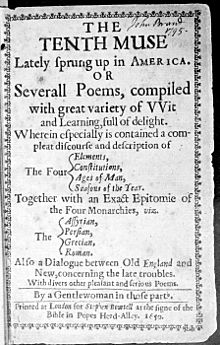
The goal of publishing her work was to show that a religious and educated woman could be a good wife and mother. It also showed she could write without competing with men.
In 1678, a revised collection of her poems was published in America after her death. It was called Several Poems Compiled with Great Variety of Wit and Learning. This book included one of her most famous poems, "To My Dear and Loving Husband".
A quote from Bradstreet is on a plaque at the Bradstreet Gate in Harvard Yard. It says: "I came into this Country, where I found a new World and new manners at which my heart rose." This quote might mean her heart rose in protest, not joy, at the new way of life. But she later accepted it as God's will.
Marriage and Family Life
Marriage was very important for Puritan women. In Bradstreet's poem, "To My Dear And Loving Husband," she shows her deep connection to her husband. She writes, "If ever two were one, then surely we." Puritans believed marriage was a gift from God.
In another poem, "Before the Birth of One of Her Children," Bradstreet talks about God's gift of marriage. She writes, "And if I see not half my days that's due, what nature would, God grant to yours, and you." This suggests that if she were to die, God would grant her husband a new wife. She also asks for her children to be protected from a future stepmother. This shows how much Puritan women believed in marriage.
In "Letter to Her Husband, Absent upon Public Employment," Bradstreet describes feeling lost when her husband is away. She says life is always better when he is around. She truly loved her husband and missed him. She did not blame him for leaving her with the family and household duties. She just wanted him back.
The main roles for women in Puritan society were to be wives and mothers. They were expected to provide for their family's daily needs. This included making clothes, cooking, cleaning, and teaching children about the Puritan way of life. Bradstreet dedicated several poems to her children. In "Before the Birth of One of Her Children" and "In Reference to Her Children," she expressed her love for them. In Puritan society, children were also seen as gifts from God. She loved and cared for her children just as she loved her husband.
Audience and Publication
Anne Bradstreet's poems were usually written for her family. They were often very personal. For example, "To My Dear and Loving Husband" was meant for her husband, Simon Bradstreet. In "A Letter to Her Husband Absent upon Public Employment," she writes to her husband who is away for work.
Bradstreet uses metaphors to describe her husband. She compares him to the seasons. When summer (happiness and warmth) is gone, winter (sadness and cold) arrives. Her husband is like her sun. When he is with her, it is always summer. When he leaves for work, everything feels like winter. She wants him to know she needs him. She is not worried about what others think. Her poems were not meant for the public.
Puritan women had to attend church services, but they could not speak or pray aloud. They were also not allowed to attend town meetings or be involved in decisions. Bradstreet was not responsible for her writing becoming public. Her brother-in-law, John Woodbridge, sent her work to be published. Bradstreet was a religious woman, and her poetry was not meant to draw attention to herself. Even though her work is famous today, it was a big risk to have it published during her time. Being a published author was not a typical role for a Puritan woman.
Common Themes in Her Poetry
The role of women is a common theme in Bradstreet's poems. Living in a Puritan society, she did not agree with the idea that women were less important than men in the 1600s. Women were expected to spend all their time cooking, cleaning, caring for children, and serving their husbands. In her poem "In Honour of that High and Mighty Princess Queen Elizabeth of Happy Memory," Bradstreet questions this belief:
"Now say, have women worth? or have they none? Or had they some, but with our queen is't gone? Nay Masculines, you have thus taxt us long, But she, though dead, will vindicate our wrong, Let such as say our Sex is void of Reason, Know tis a Slander now, but once was Treason."
Another common theme in Bradstreet's work is death. In many poems, she writes about her own death. She also writes about how it would affect her children and others. This theme of death often appears because of her own health problems. She had smallpox and partial paralysis. Her family also lost their home in a big fire. She hoped her children would remember her fondly. In her poem, "Before the Birth of One of Her Children," she writes: "If any worth or virtue were in me, Let that live freshly in thy memory."
Bradstreet also used her poetry to question her Puritan beliefs. She sometimes doubted God's mercy. She struggled to keep her faith. This can be seen in poems like "Verses upon the Burning of our House" and "In Memory of My Dear Grandchild." Her poems show a conflict that many Puritans would not have felt comfortable discussing.
In "The Prologue," Bradstreet shows how society made women's achievements seem unimportant. People believed women should be sewing, not writing poetry. "I am obnoxious to each carping tongue Who says my hand a needle better fits, A poet's pen all scorn I should thus wrong. For such despite they cast on female wits: If what I do prove well, it won't advance, They'll say it's stol'n, or else it was by chance."
In "To My Dear and Loving Husband," Bradstreet expresses her endless love for Simon. She says, "Thy love is such I can no way repay, The heavens reward thee manifold, I pray." Her strong feelings for her husband are also in "A Letter to Her Husband, Absent upon Public Employment." Her open affection helps readers understand Bradstreet's courage.
Anne Bradstreet wrote in a different way than other writers of her time. This is mainly because she wrote her feelings in a book, not knowing someone would read them. In her poem "A letter to my Husband," she talks about missing her husband when he is away: "I like the earth this season morn in black, my sun is gone." Here, Anne expresses how much she misses her husband.
She also writes: "To my faults that well you know I have let be interred in my oblivious grave; if any worth of virtue were in me, let that live freshly in they memory." Anne wants her children to remember her in a good way.
Tone in Her Poetry
Bradstreet sometimes used a sarcastic tone in her poems. In the first part of "The Prologue," she says "for my mean pen are too superior things." This refers to society's belief that she was not fit to write about wars or founding cities because she was a woman. In another part, she continues this irony by saying "who says my hand a needle better fits." This is another example of her sarcastic voice. Society at that time expected women to do household chores, not write poetry.
Even though Anne Bradstreet faced many difficulties, her poems are usually hopeful and positive. In her poem "In Memory of My Dear Grandchild Simon Bradstreet," she mentions that even though she lost her grandson, she will see him again in Heaven. In "Upon the Burning of Our House," Bradstreet describes her house on fire. But she bravely says "there's wealth enough, I need no more." Even though she lost many things, she stayed positive. She found strength through her faith in God.
Quaternions
Bradstreet wrote four long poems called quaternions. These were "Seasons," "Elements," "Humours," and "Ages." Writing these helped her improve her skills as a poet. The main idea in her work is the balance between enjoying the world and believing it is not permanent.
Selected Works by Anne Bradstreet
- Before the Birth of One of Her Children
- A Dialogue between Old England and New
- A Letter to Her Husband, Absent upon Public Employment
- Another
- Another (II)
- For Deliverance From A Fever
- Deliverance from Another Sore Fit
- Contemplations (poem)
- In Honour of that High and Mighty Princess, Queen Elizabeth
- In Reference to her Children, 23 June 1659
- The Author to Her Book
- The Flesh and the Spirit
- The Four Ages of Man (quaternion)
- Four Seasons of the Year (quaternion)
- Four Elements (quaternion)
- Of The Four Ages of Man (quaternion)
- The Four Monarchies (quaternion)
- The Prologue
- To Her Father with Some Verses
- To My Dear and Loving Husband
- Upon a Fit of Sickness, Anno 1632 Aetatis Suae, 19
- Upon My Son Samuel His Going For England, November 6, 1657
- Upon Some Distemper of Body
- Verses upon the Burning of our House
- The Tenth Muse Lately Sprung Up in America (1650) and, from the Manuscripts. Meditations Divine and Morall, Letters, and Occasional Poems, Facsimile ed., 1965, Scholars' Facsimiles & Reprints, ISBN: 978-0-8201-1006-6.
- An Exact Epitome of the Three First Monarchies (1650) (a.k.a. Exact Epitome of the Four Monarchies)
- In Memory of My Dear Grandchild Elizabeth Bradstreet, Who Deceased August, 1665, Being a Year and Half Old
Images for kids
-
Nineteenth century depiction of Anne Bradstreet by Edmund H. Garrett. No portrait made during her lifetime exists.
-
Title page, The Tenth Muse Lately Sprung Up in America, printed at London, 1650
See also
 In Spanish: Anne Bradstreet para niños
In Spanish: Anne Bradstreet para niños
 | Bessie Coleman |
 | Spann Watson |
 | Jill E. Brown |
 | Sherman W. White |


